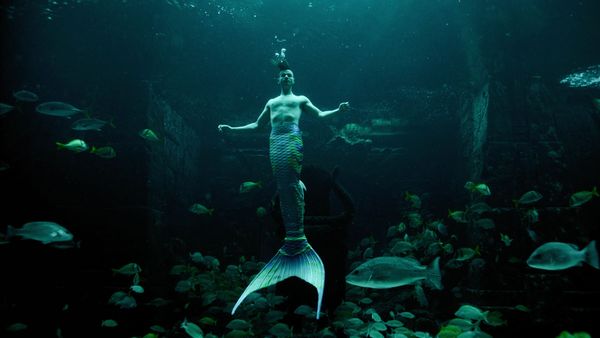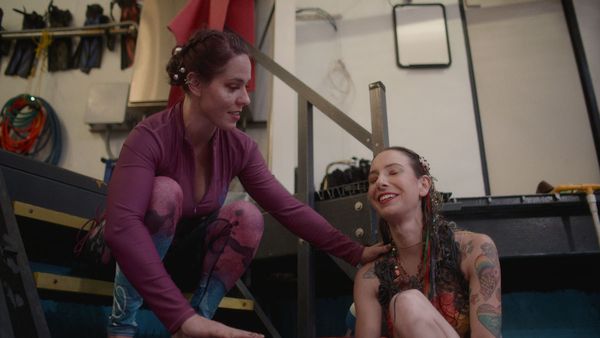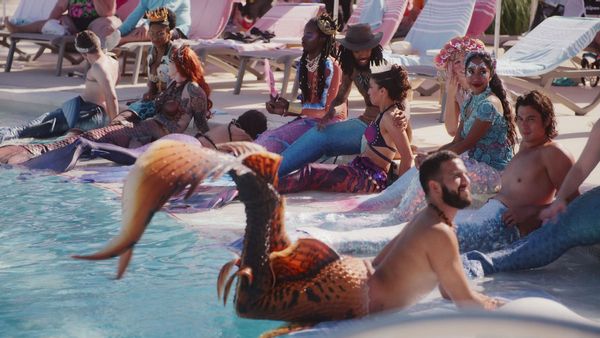
When you think of mermaids, perhaps "The Little Mermaid" or the classic "Splash" comes to mind. Or for younger audiences, "Aquamarine" or even "H2O: Just Add Water"? Maybe your mind goes to children's fairy tales, in which mermaids are fantastical creatures, destined to become princesses. Or, maybe your mind goes to classic fiction and fables, in which mermaids are portrayed as treacherous sirens, hunting and preying on touch-starved sailors at sea.
Simply put, mermaids have long been associated with fiction and folklore — after all, they have the head and upper body of a human and the tail of a fish. But for many, being a mermaid is a reality, a profession – a calling. In fact, there's a whole industry solely dedicated to professional mermaiding. And it's quite prosperous.
"Representation matters, and mermaids understand that."
That's the focus of "MerPeople," a four-part Netflix docuseries from director and executive producer Cynthia Wade. At the center of Wade's showcase is mermaiding as an artform — which is less frivolous and more dangerous and physically and emotionally taxing than one might assume. The beauty of mermaiding, however, is that it's more than just a gaudy performance. It's also an inclusive, welcoming and body-positive endeavor for women, queer folks and other marginalized groups.
Throughout the documentary, Wade introduces us to a slew of personalities. There's former mermaids from the beloved Weeki Wachee Springs State Park. There's "The Mertailor," a mermaid tail designer/manufacturer who works hard to launch his very own mermaid aquarium and training center. There's also aspiring mermaids, who struggle to plant their foot in the industry and, instead, fuel their passion via small gigs that offer measly compensation.
By the end of "MerPeople," we learn the good, the bad and the ugly sides of mermaiding. At times, the documentary feels like a mockumentary, blending an emotional story with both humor and public misconceptions. But, all in all, it's a humanizing portrait of mermaiding and how inclusive the industry continues to be.
Salon interviewed Wade, who spoke more about the inspiration behind her project, the dangers of professional mermaiding and its attraction for marginalized groups.
This interview has been edited for length and clarity.
I would love to know what encouraged you to make this documentary. How did you first hear about professional mermaiding?
Well, I love making films and I've made a lot of different kinds of films where I love to be able to tell a story from a point of view that hasn't been fully explored or of a community that hasn't been fully represented. I come from a social issue documentary background, although I direct commercials too. And so in a way, this was the sort of the perfect mash-up of that.
The documentary actually came together because of a photographer named Andréanna Seymore, who is an executive producer of the series. She was following mermaids for years and she's really known as a beautiful photographer who can really embed herself in a community that might be unknown. So, she was photographing mermaids, and she said, "I think there's a series here." She ultimately partnered with Scout Productions, the creators of "Queer Eye," and they went to Netflix and a search for a director then ensued. And eventually, I got the job as the director. I was hired about a year and a half ago, so I've been on this project for about a year and a half.
The series features several individuals within the professional mermaid community, including Eric Ducharme — a.k.a. the "MerTailor" — former mermaids from the iconic Weeki Wachee Springs State Park and Chè Monique, founder of the Society of Fat Mermaids. How did you find these individuals? What was the process like?
Andréanna had really forged the initial relationships, and then Scout had also done some initial interviews and sort of test shoots. When I came on, I really wanted to meet as many people as possible from the beginning. I spent months just Zooming with as many mermaids as I could, not only from around the country but around the world. I really wanted to gain a deeper understanding because, of course, there's not one way of mermaiding. And each mermaid's experience is different. Their persona is different. Their lived experience is different.
One of the things that's wonderful and remarkable about this community is how diverse it is and how it really is so inclusive and really allows people from all walks of life to really come and enjoy the water. That was exciting to me. And it really allowed us to figure out how we can find story arcs that really tell different aspects of the different experiences. That was important just in terms of the depth and the breadth and the diversity of the casting.
That segues into my next question. The series itself features a diverse group of mermaids, including fat mermaids, mermaids of color, queer mermaids and more. So personally, why do you feel that professional mermaiding is so diverse and so inclusive?
First, I'll just say that one of the things that really moved me about working on the series and making this series is that representation matters, and mermaids understand that. It's really remarkable to be able to sort of recognize different lived experiences but through this fantastical, beautiful, magical, enchanting underworld — this otherworldly way of expressing yourself. That was really exciting to me.
"Many of the mermaids that are in the documentary series expressed the feeling of being 'othered' in the world as they were growing up."
I think that there's something about it just being your chosen family and your safe space, where each of the mermaids, they're all different and their experiences are different, but many of them expressed that they felt smothered by traditional society, especially as they were growing up. Like Eric Ducharme, who was told that he can't have a tail because he's a boy. Chè Monique, who was told that she can't be a mermaid because she's fat. The Afro Mermaid Summit — it's so incredibly important for Black and brown mermaids to be able to come together and have a safe space to swim in these beautiful grottoes. There's something about the inclusion of it that I think is trailblazing and is really the future.
Speaking of some of the characters who are featured in the series, I'd like to focus on Eric because I found his story and also his efforts to start a mermaid training center to be incredibly compelling. I'm curious to know how profitable mermaid-specific aquariums are. And is Eric's still up and running?
He's really busy. What is compelling about his story, among other things, is that he really has leveraged everything he has to build a dream from a very small age. He saw this dream and his mother, this remarkable woman, saw it. And it was so kind of outside the box of what the expected was, but she was like, "OK, you love mermaids. We'll go with mermaids." And now, she runs the back end of his business. That he could have the vision to look at an old furniture store — which had been a furniture store on the side of a highway in rural Florida for 25 years — and say, "This could be something that could rival Weeki Wachee or even beyond that . . ." He was seeing something out of nothing in a way that a lot of artists do. Also, if we talk about diversity, he's somebody who talks about growing up with Tourette syndrome. There's sort of this obsessive quality to his brain. But those are superpowers. He is so extraordinarily creative.

You also spotlight Mermaid Sparkles, who is a woman from Arkansas who also feels "landlocked" in her endeavors to become a professional mermaid elsewhere. Why was it important for you to highlight her specific story?
This is primarily for a general audience that may not know much about mermaiding. Sparkles is "the girl next door" essentially. "I might not live in a coastal city. I might not live near a beach. I've got a job that pays the bills, barely. But I don't know how to pursue my dream, whatever that dream is." There's something that's so entrepreneurial and optimistic about Sparkles there. There's this sort of American Dream sort of feel to her. She's kind of a heroine. So, we go on the journey with her and see her perspective as the audience. We fail with her and also celebrate all her wins.

Unless they're in the water, the MerPeople have helpers, not just to zip them up but to carry them. Are there names for these helpers? Who are they?
MerWrangler is usually the term or Wrangler, but you can also have a pirate. So, either you have a pirate or a MerWrangler. Obviously if you're in the water and you're wearing a silicone tail that can be 30 to 50 pounds, you need to make it look completely effortless. But your eyes are also burning and you're practically choking on water and you can't breathe. You can't hear, you can't see but you need to make it look beautiful. Swimming in the water with those very heavy silicone tails and then pulling yourself out of the water or a tank, there's serious athleticism in it. Mermaiding is a dangerous art. So the MerWranglers are critical, certainly when we were shooting as well. We did a lot of underwater shooting. There were all kinds of safety protocols in terms of having safety divers.
Speaking of how dangerous professional mermaiding is, you open up the documentary with that really powerful scene of the professional mermaids screaming in pain while flushing out their eyes. Why did you decide to begin with that scene in particular?
That scene in a minute, certainly in two minutes, encapsulates the show in many ways where it's the magic. Just the mystical blue light coming from the water to the mermaids who are smiling and blowing bubble kisses to the adoring audience of children and parents. There's that sort of otherworldly, very gorgeous underwater world. And then you get to the surface, and it's like you're gasping for air. For the mermaids, their sinuses, their ears and their eyes are burning. Mermaiding is dangerous and it's way harder than it looks. That dichotomy between the experience in water versus the experience on land for the professional mermaids is the heart of the whole series.
What surprised you about how difficult and even dangerous mermaiding actually is? Is there any sort of union or regulating committee on work conditions?
I think that mermaiding, whether it's for a hobbyist or somebody who's pursuing it professionally, is going to really explode at an exponential rate. We're just at this tipping point with it. There's work to be done in the future. In the documentary, Mermaid Morgana Alba was somebody I wanted to focus on because she really has been at the forefront of trying to trailblaze and make things safer for the artists.
Given that Florida and other places are anti-drag queens, has the Mermaiding industry felt any blowback from that at all?
Many of the mermaids that are in the documentary series expressed the feeling of being "othered" in the world as they were growing up. Chè said, "Just living in my body every day is a radical act. And I'm not gonna apologize for it." That's amazing, that's trailblazing, that's culture-shifting and world-changing. Each one of the mermaids has felt like society was telling them to not embrace their true selves.
My team and I worked incredibly hard with the mermaids as contributors, where we were really working with them so they could film themselves. I wanted them to have a sense of ownership. I'm on the journey with them. This sort of shared journey, and really telling you from the inside out, where you can understand, even if you're not a water person, why this would be calming and beautiful and a safe space. That's what comes out in the series. It's a chosen family. And you know, it should remain so for the mermaids and for anybody who wants to try wearing a tail and being in the water and feeling otherworldly and feeling like they can leave their land problems behind.
I enjoyed the fun mer-lingo in the series. And you use that as well in the storytelling, such as the "Fin" at the end. Did you have to hold yourself back on puns or was it anything goes?
"There is still magic left in the world."
There are many situations in which a series about professional mermaiding could either feel really cheesy or try to hype up some catty drama or focus on sort of one type of mermaid — maybe the traditional type of mermaid (young, white, cis female). That's not the filmmaker that I am. I think it's really important to both bring a lot of fun to the series, but also thoughtfulness. Every morning, when the crew got up, we'd be like, "Shello!" then get all of our gear and get out of the hotel and start our day of shooting. We would also say "fin-tastic" sometimes.
None of us, however, wanted to do anything that felt very cheesy, or quite frankly, I don't know whether I can say this or not, but reality-TV-like. This is a documentary series. We really took our time with the mermaids, we shot mostly single cameras and we embedded ourselves very quietly and respectfully in the various mermaids' lives. So yeah, it's important to have some of that lexicon but it should feel like jalapeño pepper seasoning. You want the series itself to be this authentic, honest meal.
I'm not sure if you asked, but how many of the newer mermaids cited "The Little Mermaid" as an inspiration? Do you think it will inspire a new generation?
They're obsessed with anything mermaiding! Now, do I think that this is going to be the season of the mermaid? Yes. 100%.
What do you hope viewers will take away from "MerPeople"?
Mermaiding is a beautiful, fierce, gorgeous, kaleidoscopic community that is incredibly inclusive. And it gives people a home, a family, a community and friendships, a place to express who they really are, not what society asks them to be or demands them to be, but who they really are. Spending time with the mermaids was a joy, both professionally and personally. There is still magic left in the world, and I think, for me, it's about having the audience connect and their own ways of how they feel authentically themselves. There's something about a world in which you can be you and not only are you accepted for it, you're celebrated for it. But also, you can sort of find your own identity and you can also find your own community. That's what I hope the audience takes away from "MerPeople."








